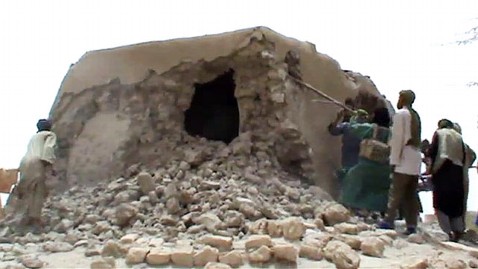Al Qaeda Destroys Timbuktu Shrines, Ancient City's Spirit

(Image Credit: STR/AFP/Getty Images)
World scholars and historians have reacted in horror to the news of an al Qaeda sect's destroying 15 th century shrines in the ancient Malian city of Timbuktu, calling the move an attack on humanity and a possible war crime.
The centuries-old mosques and tombs, which were placed on the world heritage danger list by the United Nations cultural agency, UNESCO, were struck down in West Africa by members of the al Qaeda-allied Islamist group Ansar Dine this weekend. The group took control of northern Mali three months ago and now says the relics represent idol worship, a violation of Islam.
A spokesman for Ansar Dine, which translates to Defenders of Faith, told reporters that the group plans to "destroy every mausoleum in the city. All of them, without exception." He said the group is acting in the name of God.
But for the people of Timbuktu, the al Qaeda affiliate's actions have been anything but holy. Villagers were reportedly distraught about the militants' tearing down the sacred sites.
"They came with pickaxes, they cried, 'Allah' and broke the door," a former tour guide for the once-popular tourist destination told Agence France-Press. "It is very serious. Some of the people watching began crying."
The militant Islamists destroyed at least seven relics, including the Sidi Yahya, considered one of Timbuktu's three great mosques. The mosque was built around 1400 and is part of the city's storied history as one of the centers of Islam in Africa during the 15 th and 16 th centuries, earning Timbuktu the nickname of the "City of 333 Saints," according to UNESCO.
Condemnation of Ansar Dine's actions has been swift and widespread. "The United States strongly condemns the destruction of the UNESCO World Heritage sites in Timbuktu by Islamists militants, including Ansar al-Dine," State Department spokeswoman Victoria Nuland said today.
The United States is calling on "all parties to protect Mali's cultural heritage," she added
In an CNN.com op-ed, UNESCO chief Irina Bokova called the destruction "an attack against humanity," and said the stakes of preserving these sites from falling to religious extremists is about more than just "mud and wood" structures.
"The attack on Timbuktu's cultural heritage is an attack against this history and the values it carries," she writes. "Values of tolerance, exchange and living together, which lie at the heart of Islam. It is an attack against the physical evidence that peace and dialogue is possible."
What's more, Ansar Dine's actions could constitute a war crime, the prosecutor for the International Criminal Court told Agence France-Press.
As for Ansar Dine's claim that the sites are un-Islamic, a spokesman for the Organization of Islamic Cooperation issued a statement calling their actions the work of "bigoted extremist elements."
Get more pure politics at ABC News.com/Politics and a lighter take on the news at OTUSNews.com
The organization, which is made up of nearly 60 Muslim countries, condemned the destruction, saying the "sites were part of the rich Islamic heritage of Mali and should not be allowed to be destroyed and put in harm's way."
This isn't the first time militant extremists have destroyed beloved global artifacts. In 2001 the Taliban blew up ancient Buddhist shrines in the Bamiyan Valley in Afghanistan, also a world heritage site. The brazen act, which happened before the 9/11 attacks, put the world on notice about how extreme Taliban rule had become.
Mali had been considered one of the most stable democracies in West Africa, until a coup last year. The city of Timbuktu was its crown jewel, a symbol of Mali's rich history and a tourism draw for a desperately poor nation.
Now the fabled city has turned into a casualty of an on-going war between the Malian government, rebels from the Tuareg tribe in northern Mali and Islamic militants, with no end in sight.